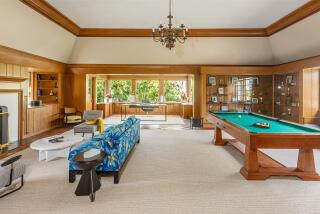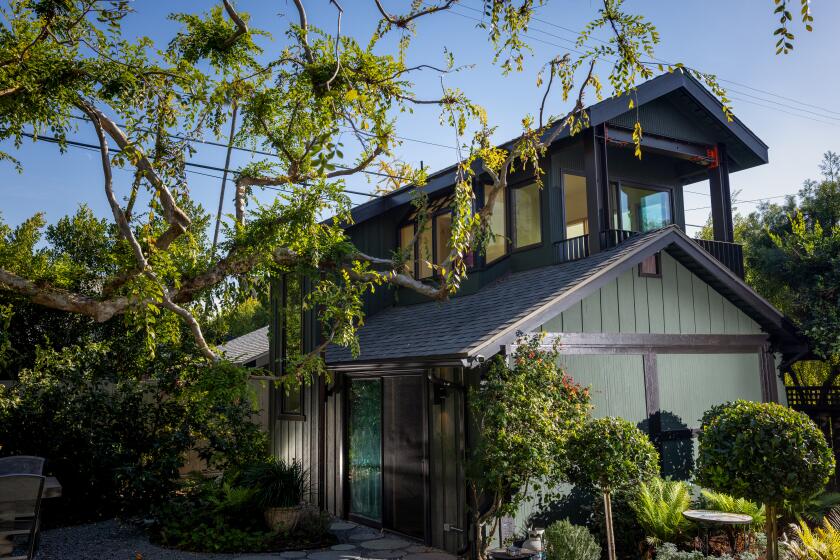Famed Ennis House is sold
Frank Lloyd Wright’s Ennis House, the 1924 hilltop mansion that is one of the master’s most celebrated residential designs and one of Los Angeles’ most revered architectural landmarks, has sold to billionaire Ron Burkle for about $4.5 million, 70% less than its original asking price.
Ennis House Foundation Chairwoman Marla Felber confirmed on Saturday the exact price: $4,458,084.58, which represents the organization’s balance on a construction loan taken out to repair L.A.’s most prestigious fixer.
At more than 6,000 square feet, Ennis House is the largest of Wright’s four “textile-block” houses in Southern California, so named because their patterned concrete blocks were knitted together to serve as structure and decoration, inside and out.
The Maya-influenced design, which consists of more than 27,000 blocks, deteriorated over time, sustained serious damage in the 1994 Northridge earthquake and then partly collapsed during heavy rainfall in 2005.
The foundation spent about $6.5 million on structural and seismic repairs to the Los Feliz landmark, and remaining repairs will cost an estimated $6 million more.
Wright’s grandson, Eric Lloyd Wright, announced in June 2009 that the foundation was putting Ennis House up for sale with hopes that a private owner could better finish the job and act as the property’s steward.
The house languished on the market even as the initial $15-million asking price tumbled.
By this January, when The Times published an article on Ennis House as part of a Landmark Houses series, the price had dropped to $7,495,000.
In a region where coastal mansions and hilltop estates exceed $10 million and the compound formerly owned by TV mogul Aaron Spelling recently went for $85 million, $4.5 million might seem low for a piece of Wright history. But Felber said the foundation had few options. Because the foundation’s top priority was responsible stewardship of Wright’s architecture, she said, the board of directors rejected larger offers from corporations. Felber would not divulge how large those offers were, where they came from or how many were rejected.
Preservationists have speculated whether a rich celebrity or house-collecting architecture aficionado would step forward and assume the responsibility for Ennis House, but Felber said the foundation had fielded “no serious offers.”
Felber confirmed that the Ennis House construction loan had been guaranteed by Burkle and that he had first right of refusal on any bid. But Felber disputed the notion that the foundation was the victim of a deal gone bad: $4.5 million paid for a property that has benefitted from $6.5 million in restoration work. She said that the first phase of restoration would not have happened without Burkle’s support and that no one else expressed a commitment to future repairs.
“He was the only one to step up,” she said.
The sale closed Friday. Burkle, who could not be reached for comment, is the founder of the investment firm Yucaipa Cos. and a fundraiser for the Democratic Party. He lives full-time in London but also owns Greenacres, the 1920s Beverly Hills estate built for silent film star Harold Lloyd. He is on the board of the Frank Lloyd Wright Building Conservancy.
As a teen living in San Bernardino County, Burkle aspired to be an architect and traveled to see Ennis House, a spokesman said. He left a note asking to be notified if the house ever were to open for touring; the owner later called young Burkle and invited him to see Wright’s creation.
The house was built for Charles and Mabel Ennis, proprietors of a men’s clothing store and admirers of Maya art and architecture.
When The Times surveyed historians, top architects and preservationists in 2008 for their picks for Southern California’s best houses of all time, Ennis House finished No. 3. Only Rudolph Schindler’s groundbreaking Kings Road House in West Hollywood and Richard Neutra’s Kaufmann House in Palm Springs ranked higher.
Architecture critic and former Dwell magazine editor Kerrie Jacobs recalled her first tour of Ennis House.
“Usually, in Wright houses, I feel a little claustrophobic, a little trapped in the man’s tightly choreographed conception of domestic life,” she said. “But during my one visit to Ennis, I felt as if I was in a different world, someplace I’d never been before -- and maybe someplace Wright had never been before either.”





